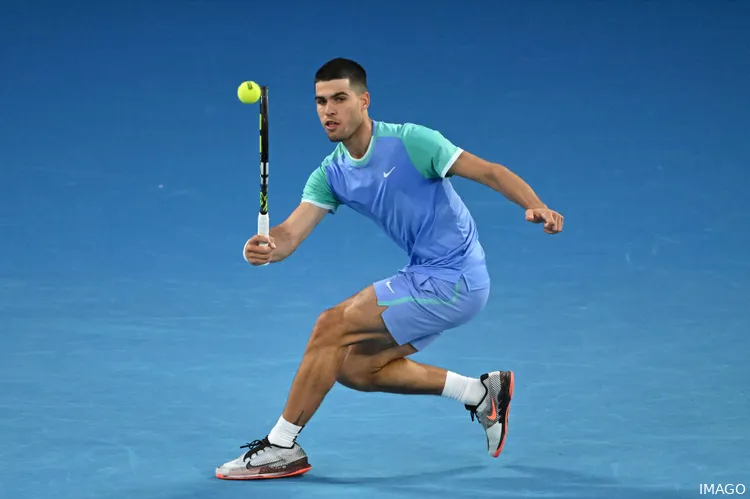
In a bold move that underscores their influence both on and off the court, tennis superstars Carlos Alcaraz and Iga Swiatek have joined forces with other top players to demand a fairer share of the profits generated by the sport’s four Grand Slam tournaments. The duo, alongside luminaries like Novak Djokovic, Jannik Sinner, Coco Gauff, and Aryna Sabalenka, co-signed a letter sent to the organizers of the Australian Open, Roland Garros, Wimbledon, and the US Open, calling for an increase in prize money to better reflect the players’ role as the heart of the sport’s global spectacle. As Alcaraz and Swiatek compete in their respective clay-court campaigns—Alcaraz at the Barcelona Open and Swiatek at the Porsche Tennis Grand Prix in Stuttgart—their advocacy highlights a growing movement to reshape tennis’s financial landscape.
The letter, penned by top-20 players and endorsed by the ATP and WTA Players’ Boards, emphasizes the need for a greater distribution of the massive revenues generated by the Grand Slams. “In essence, this letter calls for a greater distribution of profits generated by the four pillars of the tour to benefit the main stakeholders: the players, without whom the show would not take place,” the initiative’s core message reads. With the US Open boasting a $75 million prize pot, followed by Wimbledon at $64 million and both the Australian Open and Roland Garros at $58 million, the tournaments are undeniably lucrative. Yet, players argue that their earnings—while substantial compared to many sports—don’t reflect the value they bring to the table. Alcaraz, the four-time Grand Slam champion, articulated this sentiment in a recent interview, stating, “Tennis is a well-paid sport, but the percentages have to be fair. If we put on a show so the fans can enjoy it and pay to see us, then the percentage has to be close to what we deserve.”
Swiatek, the five-time major winner and a dominant force on clay, echoed Alcaraz’s call for fairness while addressing the issue cautiously during a press conference in Stuttgart. “There’s some data available on the internet about the comparison between tennis and other sports,” she said, hinting at disparities in revenue sharing. “For sure, we’ve been discussing with Grand Slams about many topics. Yeah, I mean, it could be better, but I’m not going to say a lot because, first of all, we need to figure it out kind of internally.” Her measured response reflects a desire to keep negotiations discreet, but her involvement alongside players like China’s Zheng Qinwen, who noted that increased prize money would benefit all players, not just the elite, underscores the collective nature of the push. “I think that’s going to be more beneficial for all the players, not only the top players, especially for those players that work hard during all the years and need to get paid from the Slams,” Zheng said.
The initiative isn’t just about personal gain; it’s a call for systemic change. The players’ demands include not only higher prize money but also contributions from the Grand Slams to welfare programs on both the ATP and WTA Tours. This push follows years of discussions, with a similar letter sent in 2012 yielding limited results. Djokovic, a vocal advocate through his Professional Tennis Players Association (PTPA), emphasized the need for dialogue. “I think generally the sentiment is that the players feel that we should get it, when it comes to the prize money at the Grand Slams, as close to the percentage of the prize money that we are getting on the Tour on average,” he said, urging the Slams to engage in open talks about revenue sharing and decision-making.
For Alcaraz, fresh off his Monte-Carlo Masters title and a first-round win over Ethan Quinn in Barcelona, the letter is a stand for fairness in a sport that thrives on its stars. “Tennis is a well-paid sport, but it can always be improved because there is a percentage that can be increased for the circuit and the players,” he told reporters, balancing his on-court focus with off-court advocacy. Swiatek, preparing to face qualifier Jana Fett in Stuttgart after a first-round bye, similarly navigates the dual demands of competition and leadership. Her reticence to delve into details—“I don’t want to speak out right now about that”—suggests a strategic approach, prioritizing internal resolutions over public debates.
This collective action, backed by nearly all top-10 players except Elena Rybakina, signals a new era of player empowerment. As Alcaraz and Swiatek lead their peers in challenging the status quo, they’re not just chasing titles but also a legacy of fairness. With the clay season in full swing and the tennis world watching, their letter could spark a revolution in how the sport rewards its greatest assets—the players who make the Grand Slams unforgettable.
Leave a Reply